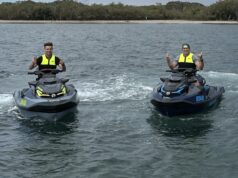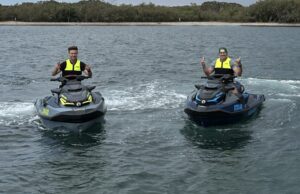Now that we’ve all got a bit more time on our hands at home, you’ll want to utilise it best you can! So, it’s the perfect opportunity to spend it in the backyard, in the pool room, or in the shed – that way you can go over all your gear, and make sure it’s in tip top condition, so when the time comes for us to get back out there, you’re ready to go!
And what better way to spend it than to maintain your boat. Go over all your safety gear, look at your expiry dates, and do all those little things you may not have had the time to do previously.
Check your motor before you leave home
It’s a good idea to start your motor before you get to the ramp. The last thing you want to do is get there and it won’t start. Just put it into a small bucket of water so the intake is covered, give it a little pull and just be listening for any unusual sounds. And lastly, just check the prop out. Have a look for any dents, or any rubbish, and in particular – any fishing line caught around it. If it’s all clear, you’re ready to go!
Put your bungs in, and don’t forget to take them out on your return home!
Put the bung in before you leave home… this is extremely important. Another tip, always carry a spare one as they can get very brittle from the sun and the salt, and may need replacing at the drop of a hat! Also keep a good eye on whether any water is coming in or out. And when you get home, take the bungs out so all that excess water can drain.
Check the condition of your life jackets
A little mistake some boaties make is having the wrong sized life jackets for the people that are going to be wearing them. Also make sure the jackets are in really good working order. This means no rips or tears, pulled stitching, faded colour, broken buckles or water-logged foam. Once confirmed, you’re good to go!
Assess your safety gear and its expiry dates
Your EPIRBS and flares need to be up to Australian Standards. They also have to be registered with Australian Maritime Safety Authority… this lasts for two years and you can easily do it online here. If you are an operator of a lightweight craft, you do have the choice to carry either an EPIRB or a Personal Locator Beacon, the above regulations apply as well.
Check the hull of your boat
Have a quick look at the hull of your boat before each trip. Look for any dents or any cracks that may appear. Also remember to give it a good wash down after a day on the water, get rid of all of that salt, and give the trailer that once over and make sure there’s plenty of air in those tyres!
Lastly, tell someone where you’re going
Something else you should adhere to if you are planning a trip on the water is:
- Tell somebody where you are going
- How many people you are on the boat with you
- What time you expect to return
These are all tips to ensure you have a safe day out!










